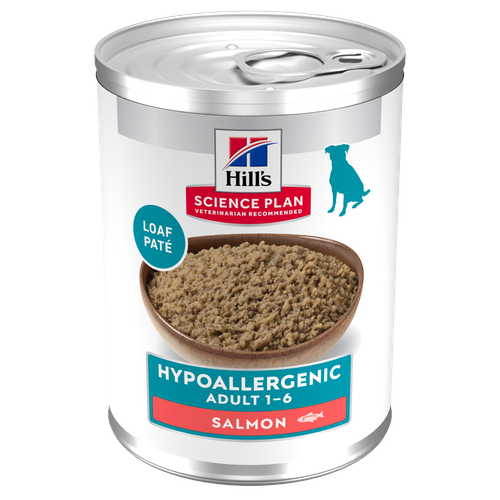
-
Find the right food for your petTake this quiz to see which food may be the best for your furry friend.Find the right food for your petTake this quiz to see which food may be the best for your furry friend.Featured products
 Adult Wet Dog Food with Beef
Adult Wet Dog Food with BeefHill's Science Plan Adult Multipack Wet Dog Food with Chicken, Beef & Turkey are complete premium pet foods for adult dogs from 1 year. Your dog will love these deliciously smooth and savoury minced loaves, formulated for balanced nutrition and overall health.
Shop Now Mature Adult Dog Food
Mature Adult Dog FoodHill's Science Plan Mature Adult Multipack Wet Dog Food with Chicken & Beef are complete premium pet foods for mature adult dogs from 7 years. Your dog will love these deliciously smooth and savoury minced loaves, formulated to deliver the appropriate amount of energy to support the needs of adult dogs.
Shop Now Puppy Food
Puppy FoodHill's Science Plan Puppy Multipack Wet Dog Food with Chicken & Beef are complete premium pet foods for growing puppies from weaning until 1 year old and for pregnant and nursing dogs. Your puppy will love these deliciously smooth and savoury minced loaves, formulated for balanced nutrition and overall health.
Shop NowFeatured products Light Adult Multipack Wet Cat Food with Chicken & Ocean Fish
Light Adult Multipack Wet Cat Food with Chicken & Ocean FishTender chicken chunks in gravy for cats, with L-carnitine and fewer calories for ideal weight management. Packed with high-quality protein, omega-6s, and vitamin E for shiny fur and healthy skin.
Shop Now Adult Multipack Wet Cat Food with Beef, Ocean Fish & Chicken
Adult Multipack Wet Cat Food with Beef, Ocean Fish & ChickenTender chunks in gravy for cats, with high-quality protein to maintain lean muscle. With vitamin E and omega-3s & -6s for healthy skin and balanced minerals to support healthy vital organs.
Shop Now Mature Adult Wet Cat Food with Chicken
Mature Adult Wet Cat Food with Chicken
Tender chicken chunks in gravy for mature adult cats. Made with easy-to-digest ingredients, high-quality protein for lean muscle maintenance and antioxidant vitamins C+E for optimal health.
Shop Now -
Dog
- Dog Tips & Articles
-
Health Category
- Weight
- Food & Environmental Sensitivities
- Urinary
- Digestive
- Joint
- Kidney
-
Life Stage
- Puppy Nutrition
- Adult Nutrition
- Senior Nutrition
Cat- Cat Tips & Articles
-
Health Category
- Weight
- Skin & Food Sensitivities
- Urinary
- Digestive
- Kidney
-
Life Stage
- Kitten Nutrition
- Adult Nutrition
Featured articles Show some love with wet foods: a great choice for pets with health issues
Show some love with wet foods: a great choice for pets with health issuesShow some love with wet foods: a great choice for pets with health issues.
Read More The Right Diet For Your Pet
The Right Diet For Your PetIn people, the right diet is very important. If you are eating the wrong way for your metabolism, activity level, age and lifestyle you could end up with health issues.
Read More The Incredible Science Behind Your Pet's Microbiome
The Incredible Science Behind Your Pet's MicrobiomeLearn what your pet's microbiome is, how it contributes to your pet's gut and overall health, and why nutrition is important in maintaining healthy microbiomes.
Read More -


There are few things that get a dog parent out of bed faster than the unmistakable sound of your dog about to throw up. Just like humans, dogs can vomit and have diarrhoea from time to time. But if your dog's tummy issues don't resolve in a day or two, you might need to talk to your veterinarian about inflammatory bowel disease (IBD) in dogs and related conditions like colitis in dogs.
What Is IBD in Dogs?
IBD is a condition that involves inflammation of the walls of the gastrointestinal (GI) tract. Sometimes this condition is also called chronic enteropathy and then subdivided into groups based on how the dog responds to different treatments: food responsive, antibiotic responsive and steroid responsive. For simplicity, we are just going to stick to the term IBD for this article.
Signs that your dog may have IBD include frequent vomiting, decreased appetite, weight loss, loose stool, frequent defecation, or liquid or bloody diarrhoea. Over time, IBD can lead to weight loss, decreased muscle mass and a poor coat. If you notice any of these signs, you should make an appointment with your dog's vet.

What Is Causing the GI Upset?
To understand the cause of GI upset associated with IBD, it is important to understand how food is broken down and absorbed by the body. When food is consumed, it travels down the oesophagus and stops in the stomach, where it undergoes digestion and breaks down into a more liquid substance called chyme. The chyme then passes into the small intestine, where most of the digestion and absorption of nutrients into the body occurs. The last stop in the GI tract is the large intestine, also called the colon. Here, bacteria break down the fibre in the food and water is absorbed. This process can be disrupted — at one or multiple points in the GI tract — by inflammation that alters the organs' ability to perform correctly .The inflammation is an overreaction by the immune system — either to something your dog ate or from a malfunction of the immune system, called an autoimmune disease. This results in discomfort and interferes with the GI tract's ability to properly absorb nutrients.
Inflammation in the stomach is called gastritis and usually results in vomiting. When the inflammation is in the small intestine it's classified as enteritis; in the colon, it's called colitis. The characteristics of your dog's diarrhoea can help the vet determine if the GI issues are caused by enteritis, colitis or both, and can help in determining the proper treatment.
How Is IBD in Dogs Different From IBS?
The clinical signs of IBD can be similar to irritable bowel syndrome (IBS) in people, but the underlying cause is quite different. IBS in people is thought to occur as a result of abnormal movement of the muscle in the intestines.


Tasty Tips
How Does a Vet Diagnose IBD in Dogs?
To determine if your dog has IBD, the vet may first perform baseline blood work and faecal testing. These tests help assess your dog's overall health and rule out other medical conditions. An ultrasound or radiographs may also be necessary to image the organs of the abdomen. In most cases, your dog’s response to a modulation of the microbiome or other therapies, such as steroids, may help with the diagnosis. In some cases, an endoscopy during which biopsies of gut wall tissue will be taken for further examination will be needed to get to the correct diagnosis and treatment.

How Do You Manage IBD in Dogs?
Once your dog is diagnosed with IBD, there are several treatment options to choose from that depend on the severity of the condition.
A dietetic meal plan is often the first line of defence. Options include easily digestible formulas, novel or hydrolyzed protein formulas and high fibre formulas. Each of these options works in a different way to help the GI tract function more efficiently.
- Maintaining and supporting the health of your dog's unique microbiome — an environment consisting of billions of bacteria and other microorganisms in the intestines — can help manage IBD. Managing the microbiome is accomplished through the use of prebiotic fibres probiotic bacteria. We are now discovering how nutrition can impact your dog's microbiome and developing formulas that help promote more of the good bacteria to help improve your dog's GI health.
Having a dog who experiences frequent vomiting or diarrhoea isn't pleasant for anyone, but there are things you can do to make your dog more comfortable, save the rugs in your home and, most importantly, improve your dog's overall health.


One of our staff authors prepared this article for you
Related products

Hill's Science Plan Mature Adult Multipack Wet Dog Food with Chicken & Beef are complete premium pet foods for mature adult dogs from 7 years. Your dog will love these deliciously smooth and savoury minced loaves, formulated to deliver the appropriate amount of energy to support the needs of adult dogs.

Hill's Science Plan Hypoallergenic Adult Wet Dog Food with Salmon is a complete premium pet food for all adult dogs from 1 year. This savoury tinned loaf is specially formulated for dogs with delicate skin and stomachs. It features a single novel animal protein source and is grain-free.

Hill's Science Plan Adult Multipack Wet Dog Food with Chicken, Beef & Turkey are complete premium pet foods for adult dogs from 1 year. Your dog will love these deliciously smooth and savoury minced loaves, formulated for balanced nutrition and overall health.

Hill's Science Plan Puppy Multipack Wet Dog Food with Chicken & Beef are complete premium pet foods for growing puppies from weaning until 1 year old and for pregnant and nursing dogs. Your puppy will love these deliciously smooth and savoury minced loaves, formulated for balanced nutrition and overall health.
Related articles

How, when and what to feed your new puppy is an important decision, learn more about the things to consider for feeding your puppy.

Many human foods are dangerous to dogs. Read about 5 of the worst toxic food offenders that can kill your dog - and how much it takes to hurt them.

Learn about the potential health risks of a raw diet for dogs and why they aren't the best option for your pup or you.

Learn effective tips for feeding a dog that's a picky eater and ensure proper nutrition for a finicky eater. Discover tips for pet parents at Hill's Pet UK.

Put your dog on a diet without them knowing
Our low calorie formula helps you control your dog's weight. It's packed with high-quality protein for building lean muscles, and made with purposeful ingredients for a flavourful, nutritious meal. Clinically proven antioxidants, Vitamin C+E, help promote a healthy immune system.
Put your dog on a diet without them knowing
Our low calorie formula helps you control your dog's weight. It's packed with high-quality protein for building lean muscles, and made with purposeful ingredients for a flavourful, nutritious meal. Clinically proven antioxidants, Vitamin C+E, help promote a healthy immune system.

